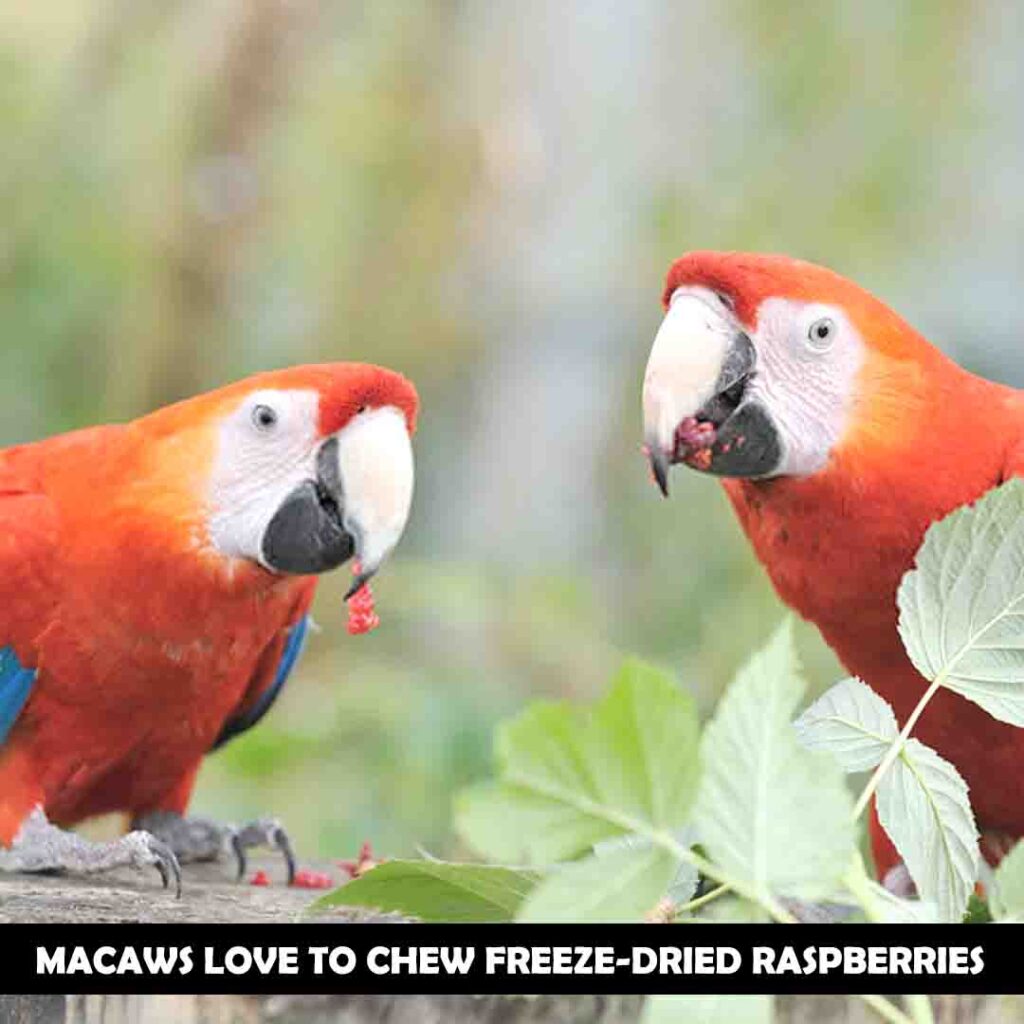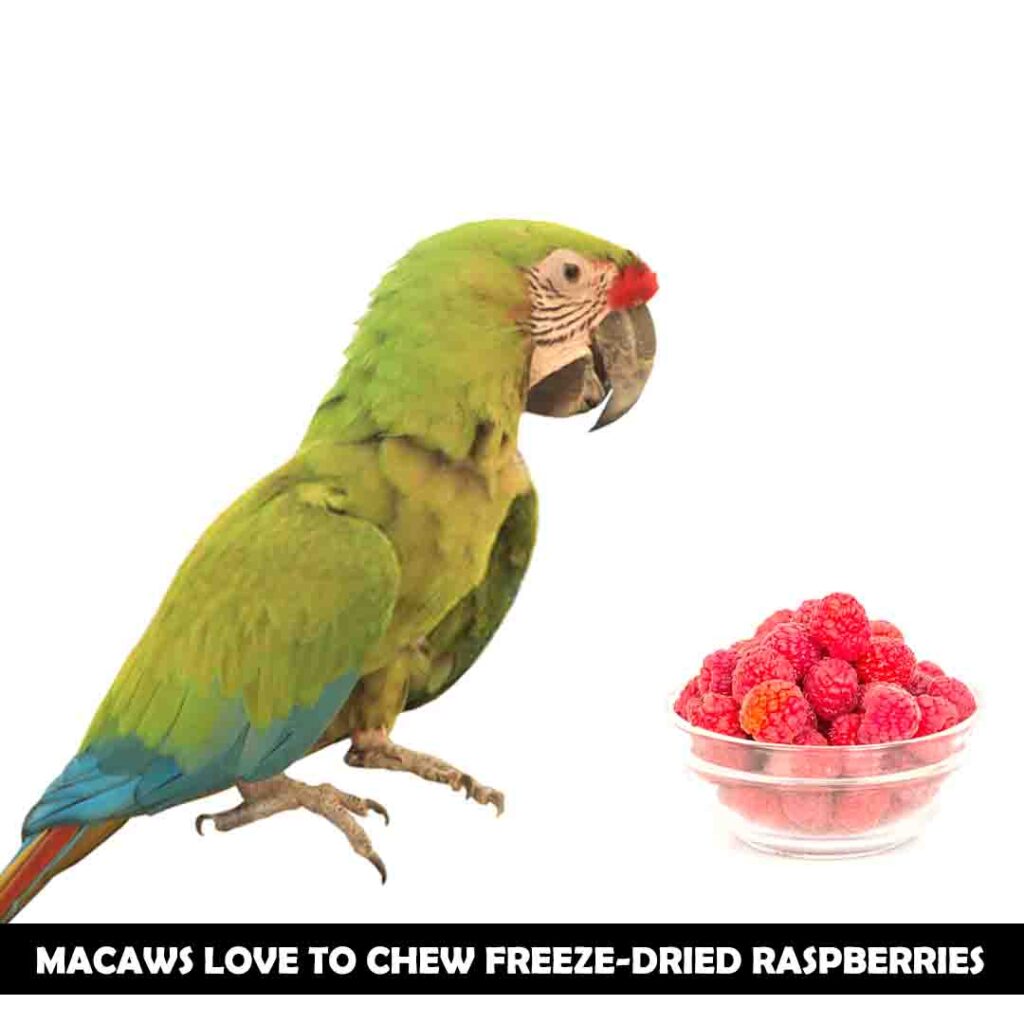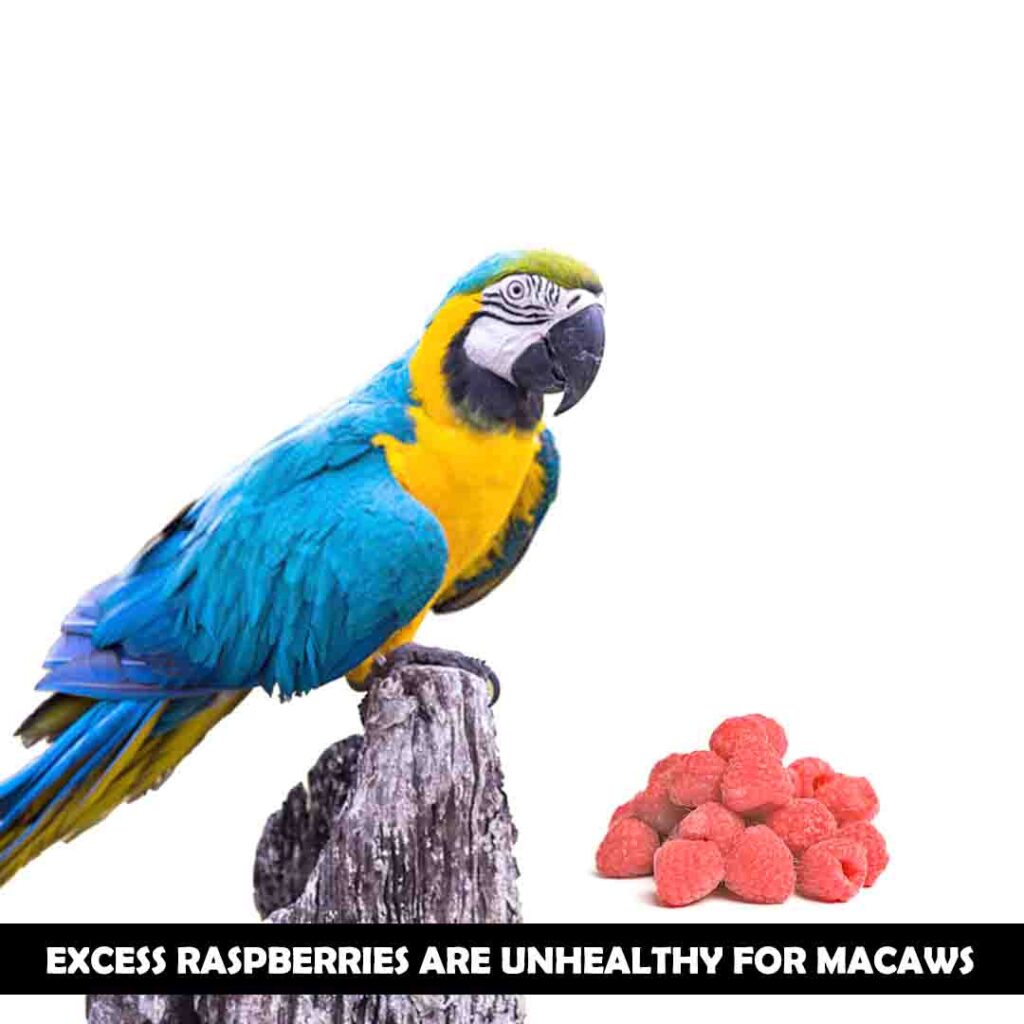Last Updated on February 17, 2022
Macaws eat different kinds of berries both in the wild and in captivity. Let’s see the impact on the health of macaws when they eat raspberries? Can they eat raspberries? Are they healthy strawberries?
Raspberries are very good for macaws as they are packed with vitamins and antioxidants. They are rich in sugar, so moderate amounts of raspberries are healthy. It is not the main diet of macaws. Fresh, frozen, and freeze-dried raspberries are safe for macaws. Only one raspberry in a week is safe.
In this article, you can better understand the importance of raspberries in the survival of macaws. How often can they eat raspberries? How can you get the maximum benefits from raspberries? Let’s discuss this in detail.
Raspberries are good for macaws
Raspberries are safe and healthy for macaws as they contain vitamins, minerals, fibers, and antioxidants. The entire fruit is beneficial. A raspberry fruit consists of drupelets, the fleshy part, and seeds. It depends on the choice of macaw and which piece of fruit it should eat or not.
In the wild, macaws eat raspberries. They can eat the whole fruit and enjoys its juicy and sweet taste. Some macaws like the unripe raspberries because of their tart taste. Leaves are also edible.

Not all, but few macaws eat so many raspberries while others eat less. It varies according to the need of macaws. Sometimes, they are eating other fruits in their diet, that’s why they eat less.
All parts of the fruits are edible and health-beneficial. That’s why you should be very clear about the types of macaws you have and what they need. To add flavor to the daily diet of the macaws, you can add raspberries. Let’s discuss the different types of raspberries you can feed the macaws.
Fresh raspberries
Fresh fruits are always the best to serve the macaws as they are rich in essential nutrients, antioxidants, and fibers. You can offer the fresh raspberries after washing them thoroughly with clean water. You can provide fresh raspberries to remove the dust or any contamination.
The flesh of raspberries is soft and easy to eat with pointed beaks, but it creates a mess. Seeds are also good for macaws. The size of the seed is tiny, so there is no danger of choking.
If your macaw is small, then cut the raspberry into four pieces and allow them to eat in a bowl. In contrast, large macaws can eat the whole raspberry. You can feed it alone or mixed with other fruits and vegetables.
Frozen raspberries
Frozen raspberries are also very nutritious and healthy. Freezing is very easy. You can freeze the raspberries when they are in abundance and cheaper. Washing and drying are essential before going to keep it in freezer.
Frozen raspberries are as nutritious as fresh and can be used for upto one year. When you need to offer the frozen strawberry, take it out from the refrigerator and when its temperature comes equal to room temperature, serve the macaws.
Raspberries contain sugars, so check their ingredients to buy the fruit from the market. Added sugars are not safe for macaws. Regular feeding of frozen raspberries will lead to obesity. So, feed them in moderation.
Freeze-dried raspberries
Freeze-dried raspberries are more crunchy and rich in flavor. Macaws feel happy to chew on these fruits. Chewing is the instinctual behavior that helps them stay mentally and physically active and happy.

It is not the main diet of macaws, so you need to offer them occasionally. Freeze-dried raspberries have fewer water contents than fresh strawberries, but the fibers in them will give good exercise to macaws.
Dried raspberries
Parrots can also eat dried raspberries, but it must be an occasional diet. In dried raspberries, the sugar contents become more concentrated when water is removed from the fruit on drying. Increased amounts of sugars in the diet can increase the weight of macaws.
So, dried raspberries are good for macaws, but they should not replace fresh fruits. You can add the dried raspberries as a snack, a foraging toy for chewing, and a reward during training.
Dehydration removes the water from the fruit and shrinks them upto one-fourth of their original size. The macaws can eat the tiny particles of dried fruits.
As water is removed, sugars remain there in a more compact form. The macaws thus get four times more sugars that are not safe.
How many raspberries should be given?
Raspberries contain more sugar with fewer fats, no cholesterol, and sodium. But they are rich in other essential nutrients. Feeding too much is not healthy. Only one raspberry in a week can fulfill the requirement.
Excess raspberries in the macaw’s diet can lead to weight gain, allergies, and stomach issues. That will increase the stress in macaws and induce certain unusual behaviors like feather plucking.

The best is to serve one strawberry every two weeks because of macaws like various fruits in their diet. In addition, provide free access to freshwater to macaws.
Health benefits of raspberries
Raspberries are beneficial for macaws, and several benefits of health are:
- Raspberries provide energy to macaws as they are rich in vitamins, minerals, and calories.
- Vitamin C and vitamin E in raspberries improve brain health, prevent skin damage and give a fresh look to macaw feathers.
- Vitamin C and folates help in cell division necessary for proper growth.
- Potassium and omega-3 are also present in raspberries that lower blood pressure and strengthen the heart muscles by lowering cholesterol.
- Manganese is essential to keep macaw skin healthy with solid bones.
- Antioxidants such as flavonoids are present in raspberries can remove the toxins from the body of macaws and protect them from diseases.
- Fibers in raspberries are healthy for macaws as they regulate bowel movement and reduce the chances of constipation and obesity.
- Vitamin K in raspberries helps macaws have solid bones and aids in blood clotting. A macaw deficient in vitamin K does not stop bleeding in case of any injury.
Risk
Besides the health benefits, there are certain risks associated with the consumption of raspberries.
- Do not overfeed the raspberries, as high sugars can lead to many health issues.
- They may contain the dust or residues of pesticides that can be fatal for macaws, even in small amounts. So always use the washed raspberries.
- Raspberries contain a salicylate compound that causes allergies such as itching and skin rash in different macaws.
Conclusion
Raspberries are very healthy and safe for macaws if taken in moderate amounts. Dried, frozen, and freeze-dried raspberries are healthy if taken in moderation. Fresh raspberries are much more beneficial than processed ones. Macaws can eat the flesh and seeds of the raspberries. Seeds are rich in vitamin E and omega-3 and are safe to consume without choking hazards because of their small size. Only one fresh raspberry one after the other week is sufficient.
Also Read About: Are Tannins safe for macaws?
Bilal is an aviculturist who loves to write in free time. His personal experience with bird care and breeding enables him to share valuable tips. So far, he has contributed more than 100 blogs to this site.
His goal is to promote bird-keeping and save endangered species.
